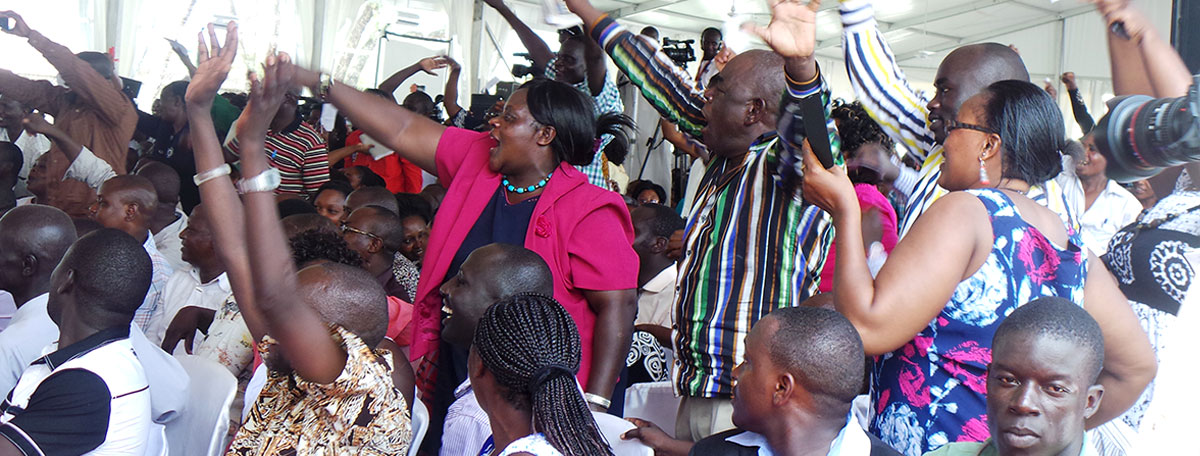
To promote participatory governance in the newly created county governments in Kenya, IRI – through funding from Foreign Affairs, Trade and Development Canada – is helping members of county assemblies engage with civil society organizations through issue-based working groups in the coastal counties of Kwale and Kilifi.
In Kwale and Kilifi, as in many places in Kenya, civil society and the county governments continue to face challenges. One year into the newly devolved system of government, county assembly members and civil society leaders continue to struggle to comprehend each other’s roles and responsibilities, which includes a constitutional mandate for citizen participation in policy making. They have yet to fully understand that one cannot work without the other and that both parties need to work together in order to promote development in their communities. Unfortunately, in many cases, civil society and the county government either do not actively engage with one another, or worse, have a competitive or adversarial relationship.
To help address these challenges, IRI conducts workshops for civil society and county assemblies where both sides increase their understanding of the other’s roles and responsibilities and of the broader importance of citizen participation in governance. The workshops are followed with joint stakeholder meetings between members and civil society, and, in the case of Kwale and Kilifi, resulted in the formation of working groups focused on early childhood development and education. These issues were particularly important to address because the new county governments have jurisdiction over early childhood development centers and polytechnic schools.
The stakeholder meetings provide a platform through which the county assembly members and civil society engage on pertinent education issues affecting their counties, as well as address underlying challenges between the groups.
In Kwale County, some assembly members initially perceived civil society as self-interested rivals since some of the leaders had unsuccessfully contested for elected office during the 2013 general elections. Due to this somewhat strained relationship, both parties were initially hesitant to hold a joint forum. However, prior to the stakeholder meeting, IRI prepared each group to engage in productive dialogue with one another in order to communicate and better understand differences, real or perceived.
When the two parties were then brought together, issues were ironed out and they agreed to work together and even developed a joint work plan to enhance citizen engagement in the county.
We will work together not only on education but also in other sectors so as to develop our county.
The meeting was so successful, Sammy Ruwa, the Kwale County Assembly Speaker committed to working with civil society on other issues, saying, “We will work together not only on education but also in other sectors so as to develop our county.”
The Kilifi stakeholder meeting also acted as an effective platform for citizen engagement. Unlike in Kwale County, the Kilifi County assembly members and civil society already had an existing cordial relationship. However, this did not translate into meaningful citizen participation due to an information gap created by a lack of proactive information sharing and regular engagement.
During the stakeholder meeting, both parties utilized the forum to identify various avenues for engagement. As a result, assembly members committed to being more informative and transparent, and civil society groups committed to attend county assembly proceedings in order to be up to date with current issues. The county assembly members also utilized the platform to brief the civil society groups on current legislation and agreed to collect citizen views on the various policy documents.
As a result of the meeting, the county assembly and civil society members developed a joint work plan through which they would enhance effective citizen engagement. Many civil society leaders such as Wilfred Mwachiru from Bunge La Mwananchi pledged to work cooperatively with the county assembly members, saying, “Blame games will not help solve any prvtoblem but will instead harm engagement between the county government leaders and the citizens. I urged the civil society organizations and the members of county assemblies to continue strengthening their relationship but they should also hold each other accountable on their roles and responsibilities through appropriate oversight.”
The next steps will be for the Kwale and Kilifi working groups to engage with the public on issues through public forums. The forums will provide an opportunity for civil society and the county government to put aside their differences and work toward a common goal: to develop citizen-informed policies that benefit the community.
By working together to engage citizens in the policymaking process, civil society and the county government will strengthen their relationship and realize that in order to develop citizen-driven policies and legislation, they need each other. County government needs civil society to help mobilize, inform and collect feedback from the public, and civil society needs the county government to pass and implement policies to deliver services and support the community.
Top